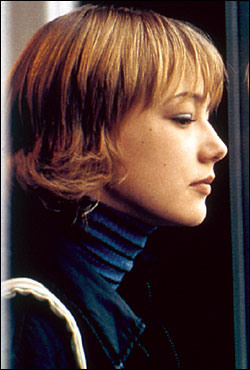How far do you run to escape from becoming your parents? In writer-director Lisa Cholodenko’s Laurel Canyon (which opens Friday, March 14 at the Harvard Exit), if your mother is a “legendary” music producer, you get away as far as you can. The outside world sees Jane Bentley (Frances McDormand) and the rock-music biz as glamorous. Her son, Sam (Christian Bale), sees itand heras chaotic and unreliable, and he’s fled to the East Coast for some comparative sanity.
Just graduated from Harvard med school, with his eye on psychiatry, Sam now calls Jane “developmentally disabled.” He’s gotten engaged to Alex (Kate Beckinsale), an old-line New Englander who may be even more of a tight-assed overachiever than he is. She has only to finish her dissertation on the genomics of the fruit fly, and she’ll have a double Ph.D.
In a stroke of fateor screenwritingthe best place for Sam’s residency is a neuropsychiatric institute in Los Angeles, putting him back on dangerously brittle turf. Jane has promised to lend them her empty house. But in one of those unpredictable shifts that dogged Sam’s childhood, they arrive to find her taking a bong break with the Brit band she’s recording in the attached studio.
McDormand’s foxy Jane holds the film from this moment on: tanned, bright blond, with an effortless pan-sexuality that comes from a lot of mileage and a nicely open mind. After a lifetime of over-optimism about the losers in her private life, she’s now guardedly in love with Ian (Alessandro Nivola), lead singer of the band, who doesn’t give a damn about their age difference. Jane is absolutely the movie’s magnet; if we’re supposed to care about the seduction of these innocents, we don’t certainly not about Alex.
As Beckinsale plays her, Alex is a bossy little priss who coaches Sam as he makes love to her and is capable of saying, “You should mind your manners,” to a rock and roller. Naturally, she’s pulled straight into Jane’s force field. When they arrive, she tells Sam primly that Jane’s “presentation is a little odd.” Before he knows what’s hit him, his fianc饠has been gobsmacked by Jane and her whole scene. It’s the story of his life in a nutshell.
For all Alex’s Harvard snobberies, there’s a certain throwaway cachet to living in this house, littered with Jane’s gold records, full of Sam’s baby pictures with Joni Mitchell or the artist of the moment. Before you can say Drosophila melanogaster, Alex has abandoned her computer for the studio, the pool, or the Chateau Marmontbut especially for the company of Jane and Ian, together or separately (but preferably together).
Sam is quite another matter: Bale makes him poignant as he struggles with a lifetime of suppressed feelings about his mother. Yet when he becomes the target of the gloriously predatory Sara (Natascha McElhone), an Israeli-born intern at his hospital, it’s hard to feel that his life has taken a turn for the worst. Yes, he’s intensely honorable; he’s also a big boy who can make up his own mind.
The real emotional stakes are between mother and son, with special pitfalls lurking for Jane, who will eventually have to decide whether to draw or blur a crucial line. McDormand plays Jane with complicated layers: Under the old-hippie trappings is a tangible vulnerability and a core of rectitude. Even in deep focus, Cholodenko frames her carefully, so that we can trace the subtlest changes as they wash over her face.
If the film sounds like a smudged version of Cholodenko’s startling 1997 debut film, High Art, set in the New York photography scene (another “glamorous” enclosed world breached by an outsider), it is. Canyon is technically more assured (especially the camera work by Wally Pfister of Memento and Insomnia) and equally well cast; yet with the exception of Jane and Sam, there are no surprises either from the surrounding characters or the storyexcept, perhaps, the surprise of Cholodenko’s cop-out non-ending. It’s McDormand’s shimmering presence, that extra weight of authority she brings to every character, that single-handedly raises this otherwise middling film to the list of the must-sees.








